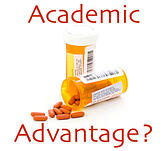Baltimore Ravens defensive lineman, Haloti Ngata, returned Sunday from his four game suspension by the NFL for violating the league's ban on performance-enhancing substances. His drug of choice: Adderall. This amphetamine is banned by every major sports organization because it provides many competitive benefits to athletes. Phillies catcher Carlos Ruiz received a 25-game suspension for using Adderall last season, and NASCAR driver AJ Allmendinger was also punished for such use.
What's so attractive about these drugs that are typically used to treat ADD/ADHD? They are believed to increase alertness, focus, and attention. Reaction time may be decreased, particularly when tired, and some find that it increases mental performance.
Athletic vs Academic Advantage
Multiple studies have shown students can achieve improved memory and focus when taking drugs such as modafinil, Ritalin, or Adderall, with manageable negative side effects. Even though these medications are supposed to be only available through a doctor's prescription, willing suppliers can be easily found online. According to Kieron Monks in the article, "Are 'smart pills' the best way to stay sharp?" these drugs "are more effective than caffeine, and represent progress based on improved understanding of biology and brain function."
So it's no surprise that such medications have become extremely popular throughout high school and college campuses. Regardless of school policies, a growing percentage of students are regularly using them to prep for exams to gain from these same benefits. While they may temporarily increase the ability to focus, and reduce the need for sleep, there is questionable proof they increase grades or performance.
What we do know is that such stimulants increase blood pressure and heart rate. At high doses and with repeated use, greater risks of stroke, feelings of hostility, and anti-social behaviors emerge. The often induced lack of sleep and poor nutrition also contribute to major health issues. Around exam season, emergency room visits spike for students who have misused some combination of such drugs and other stimulates.
The challenge for school administrators, of course, is should academic performance enhancing drugs be widely available?
Serious concerns regarding the short- and long-term effects remain, but establishing policies is difficult because students already use "supped up" energy drinks and similar over-the-counter supplements to stay more alert. For years some have argued that access to so-called "smart drugs" for exams should be viewed as a valuable benefit and available to all students.
What is your school's policy regarding the use of such performance enhancers? Based on what principles will you make these decisions? What would have to be true in order for your school to legalize them?



